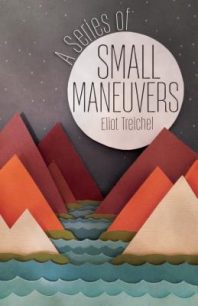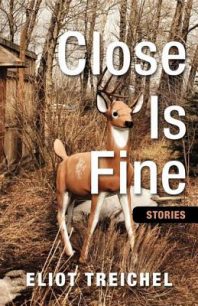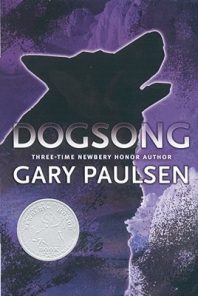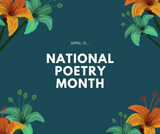APPEARED IN PRINT:
The Pacific Northwest Booksellers Association recently convened in Portland for its annual trade show, bringing together the region’s booksellers, representatives from the publishing world and 100 local, national and international authors.
As one of the show’s hosts, I’m surrounded by literary action during the show’s three-day run. Unfortunately, I’m rarely able to divert my logistical trajectory to take in the multitude of author presentations.
But a guy’s got to eat, so this year I made a plan to take a short break and drop in on the Celebration of Authors lunch, a showcase focused on Northwest writers who have one or two books under their belts but are not yet household names.
My priority was to catch the author whose new novel I’d finished just before the show. I’d previously reviewed (and endorsed) Eliot Treichel’s first book, Close is Fine, a collection of short stories, in late 2012. He’s a Eugene resident, but somehow we’d never met.
 A Series of Small Maneuvers is the story of 15-year-old Emma Wilson, who loses her father in an accident in the remote Rio Tinto wilderness of New Mexico. She is his lone companion and witness to— and, she fears, responsible party to— his death.
A Series of Small Maneuvers is the story of 15-year-old Emma Wilson, who loses her father in an accident in the remote Rio Tinto wilderness of New Mexico. She is his lone companion and witness to— and, she fears, responsible party to— his death.
If you think I’ve dropped a spoiler, read on. I am not selling out the author’s surprise.
My boxed lunch was a dud, but Treichel was a pro at the podium with his “Take two breaths, then go” themed delivery, a mantra for taking on a river, a blank page and life in general. I introduced myself that day, and we agreed to talk more about the book.
The Local Shelf: Whether you’re telling an audience about your book or a reader is diving in, there’s no attempt on your part to conceal that tragedy is the catalyst of this story. Did your idea for this book start with that convention or did the structure evolve once the nature of your story — Emma’s story — began to unfold?
Eliot Treichel: The idea for the book pretty much started with that convention in mind. I’d been on a backpacking trip in the Grand Canyon and ran into a family at a switchback fairly deep into the canyon. They had two young girls with them, maybe 6 and 10, and the youngest girl was clutching a ragged, once-white stuffed animal — either a floppy-eared dog or a rabbit.
 There was a tension in the air, and I could tell the girls had just been crying. They were adorable, but also seemed so out of place. That image got stuck in my mind, and I started thinking a lot about whether or not I agreed with the parents for putting their kids through that kind of physical rigor, about why a parent might make the choice to do that, and what those kids would do if they suddenly found themselves alone out there. I think the first line of the first draft was, “The sheriff asked me to tell him what had happened.”
There was a tension in the air, and I could tell the girls had just been crying. They were adorable, but also seemed so out of place. That image got stuck in my mind, and I started thinking a lot about whether or not I agreed with the parents for putting their kids through that kind of physical rigor, about why a parent might make the choice to do that, and what those kids would do if they suddenly found themselves alone out there. I think the first line of the first draft was, “The sheriff asked me to tell him what had happened.”
Someone once told me, “When you don’t know something is going to happen and then it does, that’s just a surprise. When you know something is going to happen, but then you have to keep heading toward it, that’s tension.”
Question: Publishers Weekly reviewed the novel positively but did note that “technical descriptions of canoeing and camping may stymie outdoor novices,” which I thought to be off the mark considering that, in the river, you gave us both a setting and an art form — in the traversing of that river — that were challenging and fascinating, because of the level that Emma and her father were participating in it all. Did it ever cross your mind that camping and canoeing could be considered esoteric, even in today’s wired world?

Per Henningsgaard and Abbey Gaterud of Ooligan Press with Eliot Treichel at the Oregon Book Awards, April 2017. Photo by Laura Stanfill
Answer: My hope is that no reader will be stymied. I worked hard to making any technical descriptions of canoeing and camping clear enough for those readers who didn’t have any outdoor experience, but also not so simplified as to bore any readers who’ve been paddling a bunch. I hope I struck a good balance. And really, more than canoeing or camping, this book is about rivers, and rivers touch us all.
Question: There’s a point in the story when Emma is alone, exposed and trying to physically and mentally block out the wind and try to sleep but instead creates her “own storm” of voices, faces, doubts, guilt — a microcosm of the adolescent angst and pressures she was carrying before she ever encountered the tragedy and challenges she now faces. She describes the cumulative sensation as a “white noise — sort of the way it got in the halls at school sometimes.” A few pages later, in one of my favorite pieces of character revelation and of your writing, she’s wearing the tarp in a loop around her shoulder like a sash. She imagines herself as a bizarre beauty contestant from Lost-in-the-Middle-of-Nowhere: Miss Placed. It’s funny and terribly sad.
The question I’m working toward is, where did you find Emma? Did you mine the hallways of a high school? Did you go back into your own teenage head? You’re very caring toward her in a way that is not condescending or sappy, but very empathetic and real.
Answer: I like that you said “find” Emma. I’m not sure if I found her, or she found me, but perhaps more than anything else I’ve written, with this book it was like I was just transcribing what my character said right onto the page. I had this strange moment when the book was first getting going where I realized that I sincerely enjoyed spending time with Emma, and on days when I didn’t write, I missed not getting to hang out with her. That had never happened before.
At the same time, I certainly mined from my experiences during my own high school years. And my daughter was a sophomore in high school when I started the book. I think the detail about the crowded and noisy halls may have even been something she once mentioned to me.
And thank you for saying that I’m caring toward Emma. I think that’s a crucial job of the author — to be caring toward his or her characters, even the ones who do bad things or make horrible choices. Especially those.
Question: I’m guessing the comparisons will come — what does Gary Paulsen’s Hatchet mean to you?
Answer: The Gary Paulsen book that means the most to me is Dogsong. I went to this very small (like 30-students small) Lutheran grade school. One of the memories I often tell my writing students about is having to drudgingly go through our brand new copies of Johnny Tremain as a class and black out each of the “bad” words our teacher told us to.
 I bring that up because, in contrast, later in the year our teacher put up a poster of that year’s Newbery Honor books. Dogsong was one of them, and for some reason, I was transfixed by the cover. I remember just standing there during recess and staring at it while other kids played. So I asked my dad if he could get it for me at the bookstore and he did. I wasn’t much of a reader before that point. But I devoured Dogsong, then Tracker, then Dancing Carl. Those books captured my imagination in ways nothing else had.
I bring that up because, in contrast, later in the year our teacher put up a poster of that year’s Newbery Honor books. Dogsong was one of them, and for some reason, I was transfixed by the cover. I remember just standing there during recess and staring at it while other kids played. So I asked my dad if he could get it for me at the bookstore and he did. I wasn’t much of a reader before that point. But I devoured Dogsong, then Tracker, then Dancing Carl. Those books captured my imagination in ways nothing else had.
Question: I’ve pointed this out in previous Local Shelf columns, but I get a kick out of recognizing bits of author inspiration in their fiction — people, places, events — things that readers can identify from our local landscape. I was completely in sync with Emma’s father in his apprehension at the prospect of managing a large party, including five or six teens, everyone ordering separate desserts, in a place where it “was always super busy and so hard to order, even when you were by yourself.”
Claustrophobia-induced grumpy dads unite! We’ve all made the sacrifice to wedge in the door of this favorite local sweet shop and wait it out, but tell the truth — have you ever bailed for the DQ, as Emma’s dad might be compelled to do?
Answer: I’m glad you could relate to that! And I’ve bailed with the best of them!
Question: You said in your presentation to booksellers earlier this month that you initially achieved eloquence via the kayak, not necessarily the pen. Are you ready to equalize your assessment of achievement in both venues?
Answer: No, not yet. Granted, I’m not running Class V whitewater anymore, but kayaking never feels like a struggle. When I’m kayaking I’m always in motion, and it’s easy for my mind to concentrate on the present moment, much easier than it is in the “real” world.
Some days writing feels that way, but more often than not, it’s a clunky, awkward process where I feel completely lost. I have an MFA, years of teaching experience, two books now, and I’m not sure I really know what I’m talking about when it comes to writing. Esoteric, indeed.
• • •
Readers may not all be familiar with the terms and tools of the river, but anyone can understand that when a major piece of Emma’s existence is suddenly gone, the life she returns to is no longer there. Stepping back into her old world is like trying to stand in a buoyant canoe. Treichel and his protagonist both handle the precariousness with tremendous grace.
As Emma’s dad always wished, I’m going to take a shot at using river as a verb: A Series of Small Maneuvers rivers (to bend, to flow; power and gentleness, to dance) sublimely among the most honest and relevant young adult fiction hitting the shelves today.
Eliot Treichel recntly won the Reader’s Choice 2017 Oregon Book Award for A Series of Small Maneuvers.
Brian Juenemann is the Executive Director of the Pacific Northwest Booksellers Association and a contributing editor for NWBookLovers.org.



